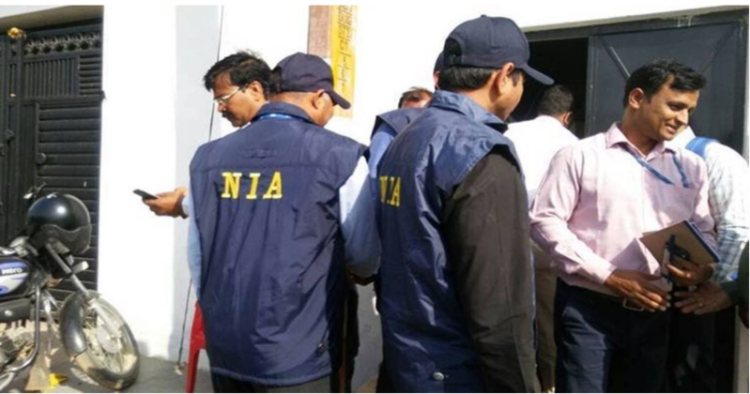CHENNAI: The National Investigation Agency (NIA) carried out searches at 11 locations across Tamil Nadu on September 24, as part of an ongoing investigation into the activities of the Hizb-ut-Tahrir (HuT), a radical Islamist organisation. The case involves the recruitment of youth for ISIS and promoting anti-election campaigns, all part of a larger conspiracy to establish an Islamic caliphate in India. The raids, conducted in districts including Chennai, Tambaram, and Kanyakumari, uncovered incriminating materials such as digital devices, unaccounted cash, and radical literature.
Background of the Case
The NIA’s investigation stems from a case initially registered by the Central Crime Branch of the Chennai Police against six individuals. These accused were allegedly influenced by the extremist ideology of Hizb-ut-Tahrir, a global Islamist organisation that seeks to establish an Islamic caliphate governed by the group’s interpretation of Islamic law. The organisation was founded by Taqi al-Din al-Nabhani, and it is known for its anti-democratic views, particularly regarding elections, which it considers un-Islamic or “haram.”
The case was later handed over to the NIA, which registered a fresh First Information Report (FIR) on July 24, 2024. Crucial documents pertaining to the case were transferred from the Chennai Police to the NIA on August 5. One of the key accused, Aziz Ahamed, also known as Jaleel Aziz Ahamed, was arrested by NIA officials on August 30 at Bengaluru International Airport while attempting to flee the country.
Details of the Raids
The raids conducted by the NIA were part of a larger effort to dismantle the growing influence of Hizb-ut-Tahrir in Tamil Nadu. According to an official statement by the NIA, “Investigations in the case so far have revealed that the accused, along with several groups of people, had carried out campaigns throughout Tamil Nadu to establish Khilafah or Islamic rule in India, and had been involved in activities aimed at dividing the people and disrupting the sovereignty and territorial integrity of the country.”
As part of the investigation, the NIA conducted searches at the residences of suspects, including software engineer Mohammed Riaz, whose home in Royapettah was raided, and Mohammed Ali, an Imam residing in Kanyakumari. Other locations included premises in Neelankarai and Seven Wells in Chennai. From these locations, the NIA seized digital evidence and literature promoting the radical ideology of Hizb-ut-Tahrir.
Arrests and Key Accused
Several individuals have already been arrested in connection with the case. Abdul Rahman, aged 26, was arrested in Thanjavur, while Mujibir Rahman, aged 46, was detained in Thiruvanmiyur, Chennai. Another suspect, Ajees Ahamed, aged 36, was also apprehended. These arrests followed the detention of several key figures in the case, including Dr. Hameed Hussain, Ahamed Mansoor, Abdul Rahman, H. Mohamed Maurice, Kadar Nawaz Sherif, and Ahmed Ali Umari.
Dr. Hameed Hussain, a central figure in the case, is a mechanical engineering doctorate and former college lecturer. He is accused of being the chief coordinator of Hizb-ut-Tahrir’s activities in Tamil Nadu. Dr. Hussain allegedly used his YouTube channel, “Dr. Hameed Hussain Talks,” and a front organisation, “Modern Essential Educational Trust,” to disseminate radical views and train recruits in extremist ideology.
The NIA revealed that secret meetings, or Bayaans, were held by the accused, where gullible youths were radicalized with Hizb-ut-Tahrir’s ideology. The accused sought military assistance from forces hostile to India, a strategy referred to as “Nusra,” to achieve their objective of establishing an Islamic state. Aziz Ahamed is believed to have been a key figure in organising these Bayaans.
NIA’s Statement and Ongoing Investigation
In a statement released after the raids, the NIA highlighted the serious nature of the conspiracy. “The searches were conducted as part of a case related to causing and creating disaffection through various social media handles and campaigning against the exercise of the electoral franchise, which is deemed by Hizb-ut-Tahrir as un-Islamic or ‘haram’,” the statement read.
The NIA’s investigation has unearthed significant evidence linking the accused to a broader network of radicalization aimed at disrupting India’s sovereignty. The materials seized during the raids will be crucial in furthering the agency’s case.
The investigation is ongoing, and the NIA is expected to make further arrests as it continues to probe the extent of Hizb-ut-Tahrir’s operations in the region.
The NIA’s raids mark a significant development in the fight against radicalization and extremism in India. The agency’s efforts to dismantle the Hizb-ut-Tahrir network in Tamil Nadu underscore the seriousness of the threat posed by extremist organizations seeking to undermine the nation’s democratic fabric. The case continues to develop, and more details are expected to emerge as the NIA advances its investigation.




















Comments